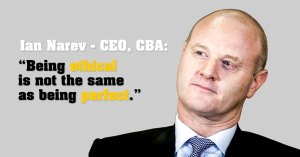The best governed organizations will have ethical failures, even criminal activities, occurring from time to time. When an organization employs 1000s of people there will always be some who make mistakes or choose to do the wrong thing. The difference between a well governed organization with a strong ethical framework and the others is how they deal with the issues.
The Bad
Over the last few months there has been a lot of commentary on major ethical failures by some of the ‘big 4’ accountancy firms (see: The major news story everyone missed: KPMG hit with record fine for their role in the Carillion Collapse). With a common theme being attempts by the partners running these organizations to minimize their responsibility and deflect blame. As a consequence, there have been record fines imposed on KPMG and massive long-term reputational damage caused to PWC by the Australian Tax Office scandal.
The Good
The contrast with the way the Jacobs Group (Australia) Pty Ltd (Jacobs Group) has managed an equally damaging occurrence could not be starker! Jacobs Group had pleaded guilty to three counts of conspiring to cause bribes to be offered to foreign public officials, contrary to provisions of the Criminal Code Act 1995 (Cth). But, the exemplary way this issue has been managed is an example for all.
Offering bribes to foreign public officials has been a criminal offence in Australia since 1995, and the Crimes Legislation Amendment (Combatting Foreign Bribery) Bill 2023 has just passed into law significantly increasing penalties.
Despite this, between 2000 and 2012, SKM was involved in two conspiracies in the Philippines and Vietnam. Both conspiracies involved employees of SKM’s overseas development assistance businesses (the SODA business unit) paying bribes to foreign public officials in order to facilitate the awarding of public infrastructure project contracts to SKM. SKM employees embarked on a complex scheme to conceal the bribes by making payments to third party companies, and receiving fake invoices for services which were not in fact rendered. The conduct was known to and approved by senior persons at SKM, although concealed from the company more widely.
Jacobs Group acquired SKM in 2013, after the conduct had ceased. During the vendor due diligence processes, the conduct came to the attention of persons outside those involved in the offending, and the company’s external lawyers.
Despite the lawyers findings being subject to legal privilege, and the very remote possibility of the Australian Authorities discovering the crime, the non-conflicted directors unanimously voted to self-report the findings to the Australian Federal Police (AFP), to waive legal privilege in the draft report, and to make it available to the AFP. The company also reported the findings of its investigation to a number of other authorities, including the World Bank, Asian Development Bank, AusAid, and ASIC.
The company and a number of individuals were charged in 2018, and Jacobs pleaded guilty to three counts of conspiring to cause bribes to be offered to foreign public officials. The matter only came to our attention because of a recent High Court ruling dealing with technical issues around the calculation of the fine to be paid by Jacobs.
When Justice Adamson in the New South Wales Supreme Court sentenced the company on 9 June 2021. She found that while each of the offences committed fell within the mid-range of objective seriousness for an offence, this was mitigated by the fact that the company had self-reported the offending to authorities, and that the self-reporting was motivated by remorse and contrition rather than fear of discovery. The sentencing judge also found that the conduct was not widespread, and effectively limited to the SODA business unit. She accepted evidence from the AFP that it was unlikely to have become aware of the conduct absent the company’s self-reporting, and that the company’s post offence conduct was “best practice” and “of the highest quality”.
Based on these findings the amount of the fine to be paid by Jacobs is likely to be in the region of $3 million – a massive discount from the potential maximum that, based on the High Court decision, is likely to exceed $32 million.
Lessons on Governance and Ethics
The approach taken by Jacobs Group, following the identification of potential criminal conduct, is a useful guide as to how an ethical organization works:
- The prompt retention of independent external lawyers to investigate suspected instances of criminal misconduct.
- The decisions of the board of directors to self-report the conduct to authorities and provide ongoing assistance and cooperation to law enforcement and prosecutorial authorities, notwithstanding the risk of criminal sanction.
- Committing to remediation steps to address the conduct (and seeking to prevent any repeat of it), including by overhauling relevant policies and procedures and making appropriate operational changes including:
- suspending and then terminating relevant individual employees who had participated in the conduct;
- operational changes to management and oversight of the SODA business unit that had been involved in the conduct, and changing approval processes for all payments by that unit;
- introducing a new Code of Conduct which explicitly prohibited the offering of inducements to public officials;
- introducing a requirement for the completion of a bribery and corruption risk assessment before committing to new projects;
- upgrading various internal policies, including the company’s whistleblower, donations and gifts and entertainment policies. It also introduced new policies which discouraged the use of agents, and required the screening of all new suppliers and sub-consultants for bribery and corruption risk. The company also engaged an independent monitor to review the changes made to its policies;
- updating and expanding existing bribery and corruption training programs for staff; and
- modifying internal audit practices to more closely scrutinize non-financial risks, such as bribery and corruption.
One definition of ethical behaviour is doing the right thing when no one is looking. The contrast between Jacobs and KPMG’s outcomes is a lesson worth remembering.
For more on governance and organizational ethics see: https://mosaicprojects.com.au/PMKI-ORG-010.php#Overview



















